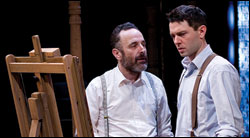Source: Variety
Date: January 15, 2009
Byline: Toby Zinman
Theater Review: My Name Is Asher Lev

Adam Heller, left, and Karl Miller, as the title character, star in the Arden Theater production of the art vs. religion-themed 'My Name is Asher Lev.'
(Arden Theater, Philadelphia; 374 seats; $48 top)
'My Name is Asher Lev'
An Arden Theater Company presentation of a play in one act written and directed by Aaron Posner, adapted from the novel by Chaim Potok. Artistic Consultant, Adena Potok.
Man — Adam Heller
Asher — Karl Miller
Woman — Gabra Zackman
Not a dry eye in the house (well, maybe two). Even the piano sobbed. Capitalizing on the strong and schmaltzy traditions of Yiddish theater, Aaron Posner builds on his 1999 success, "The Chosen," with another adaptation of a Chaim Potok novel, "My Name Is Asher Lev." Generating considerable regional interest even before the new show opened, Posner has likely struck paydirt again with this three-actor play about a young man torn between his insular Hassidic community of Orthodox Jews in Brooklyn and the artistic gift that drives him to paint and ultimately leads him into the wide world.
The show opens with Asher Lev (Karl Miller) a grown man, already a world famous painter. "Torah Jews," he tells us, "do not become painters": visual art is seen as both sacrilege and narishkeit (foolishness). Asher Lev has been called "traitor, self-hater, blasphemer, inflictor of shame upon his family." He narrates this portrait of the artist, starting at age 6; he participates in scenes which dissolve as we move forward in time, then steps out to address us directly.
Some of these monologues are explanations of feelings or situations, some are philosophic pronouncements about the function and nature of visual art. Because there's no physical action in the play, these speeches are often overwritten and overwrought, as though to compensate with the energy of Big Ideas. The production's austerity of set and costuming combined with the lack of physical event provides interesting contrast to the actors' melodramatic gestures, achieved entirely through arms and hands.
Asher's young, tender, neurasthenic mother (Gabra Zackman) tries to understand him and is forced into the painful position of negotiating between her husband and son. The image of her standing in the window (a picture frame in Dan Conway's clever, spare set) haunts both the play and her son's memory. Zackman also appears briefly as a painter's model and a gallery owner — an imperious, exotic woman far more interesting in the novel than in this snippet.
The boy's father, a respected agent of the revered Rebbe who rules the community, is infuriated and disappointed by his son's refusal to stop drawing. When the Rebbe intervenes, arranging for Asher Lev's apprenticeship with artist Jacob Kahn, Asher's career is launched, and the struggle between what Asher calls his father's "aesthetic blindness" and what his father calls Asher's "moral blindness" begins.
All the men — Asher's worldly uncle, his stern father, the wise rabbi and the secularized Jew Kahn (based on Jacques Lipchitz), who makes grand proclamations about art and truth and courage — are played by Adam Heller with quick changes in costume and nuanced accents.
These accents are significant, since each role in the play is marked by a very distinct speech pattern, imitating the formal, often stilted prose of the novel quite plausibly. The problem is that each person's note never varies, no one ever speaks in what seems to be a 'natural' voice, so that they remain more characters than people.
Posner's adaptation does justice to Potok's ethnographic novel by creating the thick, claustrophobic atmosphere of a culture embedded in and insulated against the mainstream. As the director, he shrewdly opts to leave all the drawings and paintings to our imagination — blank paper, empty picture frames — thus solving the tricky problem of art on stage.
The climactic event — staged entirely through Thom Weaver's impressive lighting design — is a major exhibition of Asher Lev's work, including two paintings depicting his mother crucified. The irony is that his parents, who leave stunned — religious horror compounded by filial betrayal — agreed to come to the exhibition because he assured them there would be no nudes.
Set, Daniel Conway; costumes, Alison Roberts; lighting, Thom Weaver; sound, James Sugg; production stage manager, Alec E. Ferrell. Opened, reviewed Jan. 14, 2009. Runs through March 15. Running time: 1 HOUR, 30 MIN.

